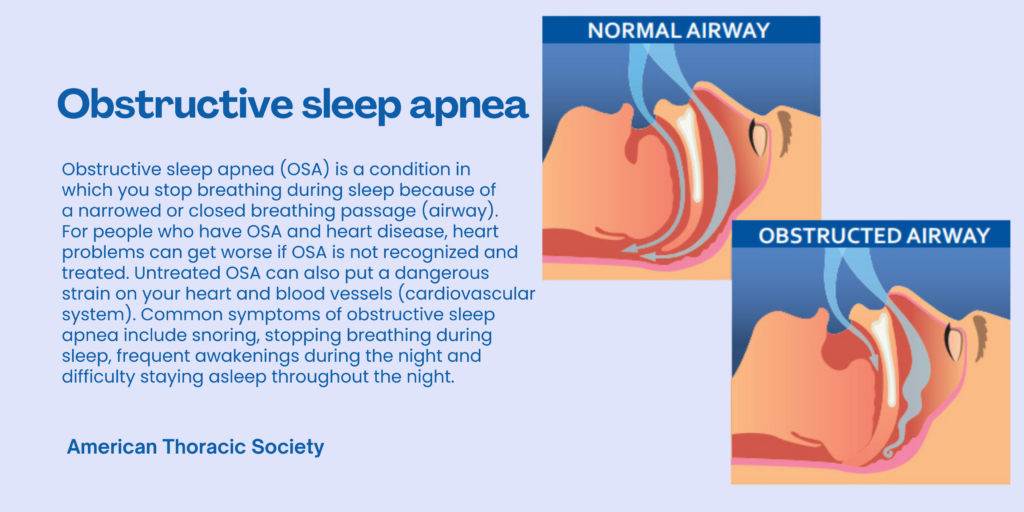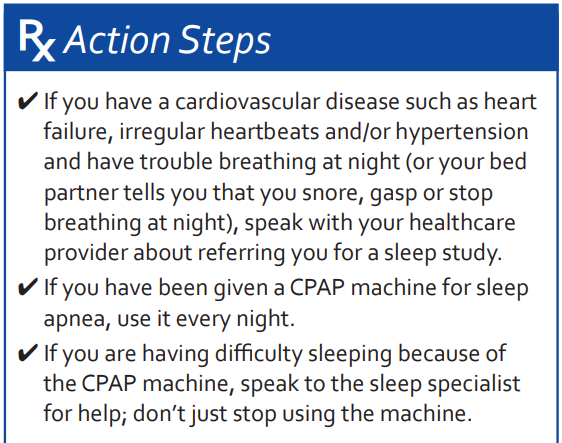
It is also common for people who have obstructive sleep apnea to be tired and sleepy during the day. This sleepiness can cause accidents at work, poor work performance, and car crashes. Obstructive sleep apnea can also have bad effects on your heart and your blood vessels (arteries, veins and capillaries).
What kinds of cardiovascular problems can I get with obstructive sleep apnea?
Several cardiovascular conditions can happen with untreated obstructive sleep apnea. For example, if you have obstructive sleep apnea, you are more likely to have high blood pressure (hypertension) or it may be difficult to control your high blood pressure. Of all people with hypertension, about 30% have obstructive sleep apnea. If you have obstructive sleep apnea, there is a 50% chance you also have hypertension.
Problems with the rhythm of your heart may occur with OSA such as atrial fibrillation (a type of irregular heart beat) and bradycardia (slow heart rate). People with severe obstructive sleep apnea are four times more likely to have atrial fibrillation compared to those without OSA. Not receiving treatment for your sleep apnea may make your atrial fibrillation difficult to control. For example, in people who have atrial fibrillation treated with catheter ablation (a special procedure done to the heart), those with untreated obstructive sleep
apnea are 25% more likely to have their atrial fibrillation return.
People with obstructive sleep apnea are also more likely to have coronary artery disease. Coronary artery disease (also known as the hardening of the arteries) happens when the small blood vessels that supply blood and oxygen to your heart become narrow. Narrowed coronary arteries can lead to heart attacks and heart damage. If you have severe OSA that is untreated, you are twice as likely to develop a heart attack in the future as those without OSA. In addition, research shows that up to 70% of people admitted to the hospital because of coronary artery disease were found to have obstructive sleep apnea. If you have heart failure, obstructive sleep apnea can also make it worse. Also, people with untreated obstructive sleep apnea can develop heart failure. In addition, the chance of having obstructive sleep apnea if you have heart failure is quite high.
How does obstructive sleep apnea cause
heart disease?
The reason why people with obstructive sleep apnea develop heart disease is not exactly known. Obstructive sleep apnea causes you to have frequent pauses in your breathing; these pauses mean that you actually stop breathing. Sometimes this will cause you to wake up at night but you may not be aware of them. When these breathing pauses happen, the oxygen level in your blood gets low. It is thought that the frequent drops in low oxygen levels during sleep damages the blood vessels that supply the heart. Also each time then oxygen level drops, your body tells your heart to beat faster and your blood pressure to go up. Stress on the heart from severe OSA can also cause the heart to get enlarged. An enlarged heart does not pump as well and the heart and body gets even less oxygen.
Will treating my obstructive sleep apnea treat my
heart disease?
Yes, treating OSA can help prevent and/or improve heart problems. The most common way of treating obstructive sleep apnea is with a mechanical device known as continuous positive airway pressure (CPAP). The CPAP machine blows air through a hose into a mask worn snugly over your nose or mouth. This air helps keep your airway from closing during sleep. This corrects your sleep apnea, prevents your blood oxygen levels from falling during sleep, and allows you to get a more restful sleep. Using CPAP regularly at night as prescribed by your healthcare provider also helps lower the stress on your heart. If you have atrial fibrillation, CPAP use may control your irregular heartbeat. If you have both severe sleep apnea and hypertension, CPAP may help control your blood pressure. People can become comfortable with wearing the CPAP device over time. Those who wear CPAP at night often say that they are getting the best sleep that they have gotten in a long time. Some people though may have trouble getting used to sleeping with the CPAP device. If you are having difficulty, speak with a sleep specialist to be sure you have the right nasal or full-face mask and the right setting for you. There are very good reasons to try and use the CPAP every night. CPAP therapy can help you control the symptoms of your sleep apnea and prevent or control the heart-related problems associated with sleep apnea, which are often severe and life limiting.
Authors: Jeremy Weingarten, MD and Susmita Chowdhuri, MD
Reviewers: Suzanne C. Lareau RN, MS, Margaret-Ann Carno PhD, RN, CPNP, Marianna Sockrider MD, DrPH
References:
American Thoracic Society www.thoracic.org/patients
American Heart Association http://www.heart.org/HEARTORG/Conditions/More/MyHeartandStrokeNews/Sleep-Apnea-and-HeartDisease- stroke_UCM_441857_Article.jsp
Harvard Healthy Sleep http://healthysleep.med.harvard.edu/railroad-sleep/problems/apnea
Sleep Foundation https://sleepfoundation.org/ask-the-expert/sleepapnea-and-heart-disease



